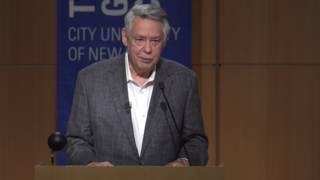
Related
FEMA Administrator Brock Long is traveling today to Puerto Rico and the U.S. Virgin Islands to see firsthand the damage caused by Hurricane Irma. In Puerto Rico, 300,000 remain without power—despite the fact that the island was barely hit by the storm. Authorities have warned parts of Puerto Rico could be without electricity for up to six months, in part due to the island’s economic crisis. We speak with Juan González about how U.S.-imposed austerity and divestment are contributing to the electricity crisis after Irma.
Transcript
AMY GOODMAN: This is Democracy Now!, democracynow.org, The War and Peace Report. I’m Amy Goodman, with Juan González. The FEMA administrator, Brock Long, is traveling today to Puerto Rico and the U.S. Virgin Islands—he just announced this this morning—to see firsthand the damage caused by Hurricane Irma. On the island of Saint John in the Virgin Islands, 80 percent of homes have been severely damaged. Meanwhile, in Puerto Rico, 300,000 people remain without power. Authorities have warned parts of Puerto Rico could be without electricity for up to six months, in part due to the island’s economic crisis.
Juan, you’ve been closely covering the situation in Puerto Rico. What does the hurricane have to do with the political crisis in Puerto Rico?
JUAN GONZÁLEZ: Well, first of all, I think it’s important to understand that the hurricane didn’t really hit Puerto Rico head-on like it did in Cuba or even in the other Caribbean islands. It basically glanced the island. And yet, many people on the island were stunned to see the—so much electricity go down. As you mentioned, at the beginning, when the hurricane hit, about as many as a million people went without electricity, and about a third of the people lost water, because so many of the pumping stations, water pumping stations, in Puerto Rico depend on the electrical grid for their power source, so that there are hundreds of thousands of people also without water on the island.
And the reality is that the electrical system of Puerto Rico has been in crisis now for decades. And just one example, the electrical company, which is a government-owned electrical company—it’s called PREPA, the Puerto Rican Electric Power Authority—in 2000, had about 7,000 linemen to take care of repairs along the system. Today it has 3,500. Fifty percent of the workforce has been reduced. And so, when even a hurricane like this gets near the island, it creates enormous devastation for the electrical system. And now this has become the basis for the attempts to privatize the electrical system, because the electrical company is the crown jewel of industry in Puerto Rico. Everybody needs electricity, especially in an island that is so hot and humid and is so industrialized, so that there’s been efforts now to try to privatize PREPA.
And, of course, the source of how the electricity is generated in Puerto Rico is critical. One example, 51 percent of all the electricity in Puerto Rico is produced through burning petroleum, compared to less than 1 percent of all the electricity generated in the United States is generated through petroleum. In addition, coal and natural gas—fossil fuels amount for about 98 percent of the generating power of the electrical system in Puerto Rico. Very little wind or solar generation.
So part of the problem is that Puerto Rico has the most expensive way of generating its electricity, and then there’s no investment in the capital infrastructure or in the workforce. So, anything like this, a hurricane like this, immediately creates a crisis that will be for months in order to be repaired.
AMY GOODMAN: Well, we’ll continue to follow what’s happening in Puerto Rico. Any final comments? And did you hear—you were born in Ponce, right?
JUAN GONZÁLEZ: Yes.
AMY GOODMAN: Did you hear how it was affected?
JUAN GONZÁLEZ: It wasn’t affected. In fact, I talked to my sister, who lives in Cayey, in the center of the island. And they said they had—they were surprised how little impact of the actual hurricane was on the island, yet everyone lost electricity.












Media Options